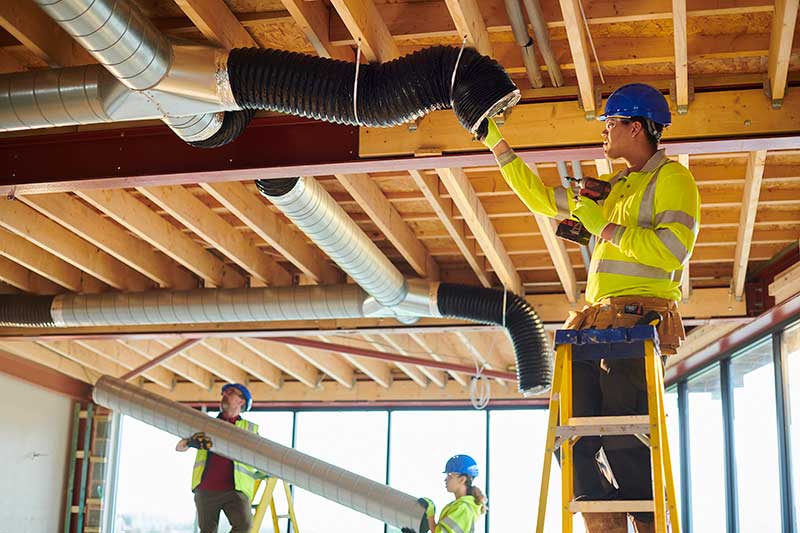Are you interested in becoming an HVAC technician and wondering if a diploma is required? If you want to become a “licensed HVAC technician,” you must first complete a diploma program at a trade or technical college. Without a license, you may be relegated to menial tasks and continue to be under the supervision of another licensed HVAC technician for the rest of your career.
Why Do You Need a Diploma to Be an HVAC Technician?
During an HVAC diploma program, you learn the fundamentals of HVAC systems and how they operate. From there, you learn about the tools and techniques of the trade, and at graduation, you are well versed in how to diagnose, make repairs, install, and replace parts in many different types of HVAC models. The skills you learn qualify you to begin your first entry-level HVAC job as an apprentice. From there, you will continue to learn under a supervisor until you are ready to take your HVAC license exam.
Everyone who aspires to become a technician must earn an HVAC diploma from a certified trade school before they can sit for the licensing exam.
What Do You Learn in an HVAC Diploma Program?
HVAC education is broken down into units, which makes it easier for you to grow your knowledge alongside new HVAC skills. Each section is designed to help you understand the inner mechanics and theories of HVAC as well as unique skills and standards for repairs and installations. Below are some of the most important subjects you’ll encounter in an HVAC diploma program:
Air Distribution
Air distribution systems move air through ductwork and deliver filtered air into a home or business. Learning about air distribution includes studying the principles of heating, cooling, and temperature control found in every HVAC system.
Ventilation
HVAC ventilation is the core technology that heating, ventilation, and air conditioning systems use to deliver hot or cold air to a location. Ventilation is responsible for drawing warm or cool air out of a room and blowing it outdoors through an exhaust pipe; ventilation also affects filtration, so it’s vital for good indoor air quality. In hospitals and labs, ventilation is even more crucial because a certain level of filtration must be always maintained for sanitation and safety.
Maintenance & Diagnostics
You will learn how to perform routine assessments and maintenance on residential, commercial, and industrial HVAC systems. Your ability to detect malfunctions is important, but you also need to know how to determine when a system could be optimized and perform the necessary changes. Diagnostic practices are taught by industry experts who have years of fieldwork under their belts. During the diploma program, you’ll work alongside professionals on real equipment learning how to choose the right tools, run diagnostics and make repairs and upgrades.
Electronics and Control Circuits
In addition to electrical theory, during a diploma program, you will learn how to work with various control circuits and electric components in an HVAC system. This plays an integral role when working with electric heat and maintaining thermal control in a system. Too much electricity can lead to fires while a low current can cause a system to malfunction or underperform.
HVAC Accessories
What accessories are most important for an HVAC technician? Fans, ducts, blowers, remote controls, and smart thermostats are all different types of accessories that you’ll come in contact with. Knowing how each one works, how to install them, and which ones to recommend to customers are all part of the job.
Metering and Compressors
HVAC metering devices affect the temperature of an air conditioning system by reducing the pressure applied to the refrigerant in a unit. The compressor is fundamental to the performance of an HVAC air conditioner; it serves as the core refrigeration unit, and it’s responsible for both cooling and dehumidifying the air in a residence or building.
By learning about HVAC meters and compressors, you’ll be able to diagnose AC problems and identify the optimal solution for your clients.
Heat Pumps
You will find a heat pump outside of a home. Like an air conditioner, it relies on a chemical refrigerant to draw heat from inside the home and push it outside. Air conditioners, however, can only cool a space. Heat pumps can offer warmth as well. You will learn the difference between an air conditioner and heat pump as well as how to maintain, repair, and install them.
Refrigeration
The process of refrigeration is integral to any HVAC system. Without it, the unit would be unable to heat or cool air coming into a building. You’ll learn how to handle refrigerants as well as how to make repairs to systems that are using too much or too little. Refrigeration training also includes working on refrigeration devices. You will learn how heat is affected by refrigeration output and ways to assess a system’s performance.
Hydronic, Airside & Balancing Systems
Different types of HVAC models rely on different methods for stabilizing temperatures and performing their duties. Hydronic systems use water to transfer energy; airside systems, like space heaters and window air conditioning boxes, rely on fans and ventilation to work. Balancing an HVAC system requires optimizing its existing hardware to ensure even airflow and heat distribution throughout a home or building. You will learn how to balance different systems based on their model and technology.
Codes and Licenses for Energy
Energy regulations help an HVAC technician operate within different heating, ventilation, and air conditioning energy codes and understand their impact on the HVAC profession. Energy licenses, such as EPA certification, are required for people to pass the HVAC license exam. You must learn the standards of energy use and environmental protection to safely perform your job. By learning the codes and regulations, you can ensure that the work you do is aligned with the current industry standards, thus avoiding liability, and preventing any undue harm to people or the environment.
Career Development
Part of the career development unit includes an externship to gain real work experience as well as HVAC certification preparedness training. While you get plenty of practice in the classroom, an externship allows you to work in the field with licensed HVAC technicians as your supervisors and mentors. You will begin to learn what a career in HVAC truly entails and figure out what direction you’d like to take your own career after graduation.
Career development also includes building a strong resume, mock interviews, and job fairs for job placement assistance. One of the major advantages of a career in HVAC is there are lots of opportunities available. Once you’re hired, staying employed and finding new work is easier than it is in other fields. There will always be a need for certified, skilled technicians in every industry.
What Are the Benefits of Taking an HVAC Diploma Program?
During an HVAC diploma program, you get to learn from experts who have dedicated their lives to mastering HVAC and now wish to help students like you launch their careers. By studying under professionals and following a trade school program, you can gain knowledge and skills much faster than those that try to learn on the job. While some people may be able to get apprenticeships without a diploma, they are never able to get their license or grow in their field.
You get to learn far more than just HVAC; science and mathematics also play a large role in the curriculum. You’ll build confidence as you work in labs on real equipment and receive guidance from your instructors. When you’re close to completing your program, you’ll still have the support of the school through externships and career services.
Final Thoughts
Now that you are interested in getting a diploma to become a licensed HVAC technician, it is time to learn more about the program at ATA College. HVAC technicians work in a variety of locations according to their skills and preferences; you could work for a local company and service residences and businesses or become a freelance contractor or start your own HVAC company. There are plenty of paths to consider, but they all begin with your education at ATA College.
HVAC Technician Diploma
The HVAC Technician II program has been designed to prepare graduates for entry-level positions as a Heating, Air Conditioning, and Refrigeration Mechanic and/or Installer through relevant classroom knowledge and hands-on technical skills. This program’s learning objectives have been developed by the National Center for Construction Education and Research (NCCER) and prepare students to take the EPA 608 Universal Certification before graduation. Learn in small classrooms or hybrid! Gain hands-on experience and college credits with local employers during a five-week practical externship.
Contact us today to learn more about HVAC technician career opportunities offered at ATA College.





